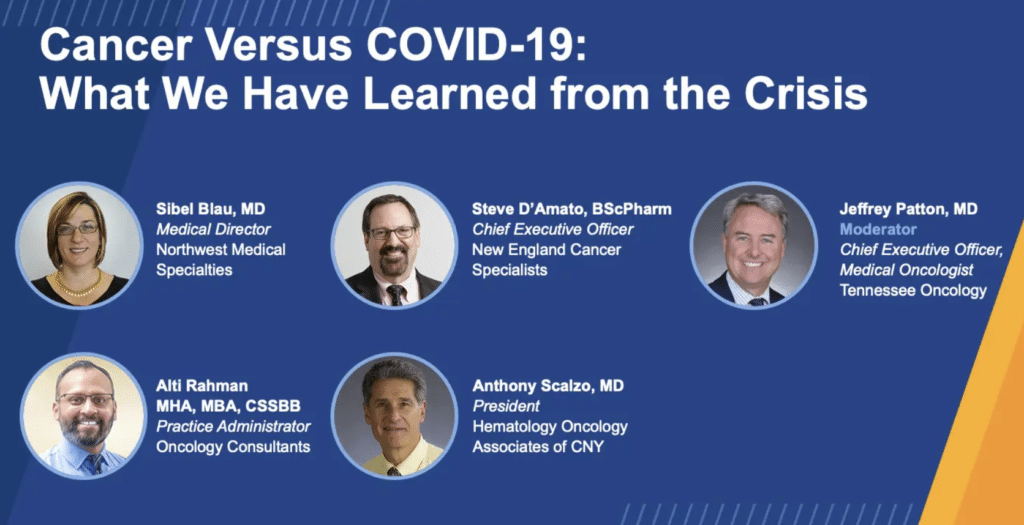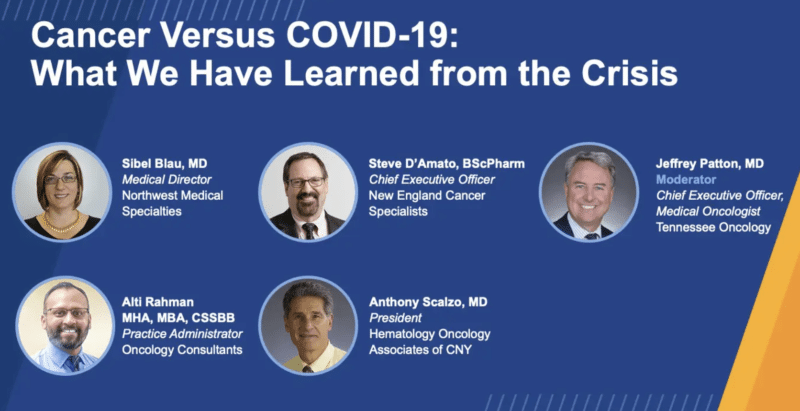
The recent Community Oncology Virtual Conference included a panel discussion titled, “Cancer vs. COVID-19: What We Have Learned from the Crisis.” The panel was moderated by Jeffrey Patton, CEO of Tennessee Oncology and included:
- Sibel Blau, MD, Medical Director, Northwest Medical Specialties
- Steve D’Amato, BScPharm, Chief Executive Officer, New England Cancer Specialists
- Alti Rahman, MHA, MBA, CSSBB, Practice Administrator, Oncology Consultants
- Anthony Scalzo, MD, President, Hematology Oncology Associates of CNY
It was really inspiring to hear how these cancer care providers quickly mobilized to respond to the COVID-19 crisis and a common theme they all shared was teamwork. All of the panelists described swift, practice-wide responses to COVID-19 that couldn’t be done without clear leadership, consistent communication and flexibility.
So what lessons did they learn?
Technology has an important place in cancer care.
Telehealth has not only been a really important tool during the COVID-19 crisis, but it will be very useful moving beyond the pandemic. The panel shared a lot of positives from their experiences so far with telehealth, in addition to the surprising fact that patients like it and providers very quickly adapted. One panelist felt it has improved the quality of care in some cases – for instance, a patient with family in another state can still include them for a consultation. And it’s enabled providers to maintain contact with patients beyond a phone call – especially those with abandonment concerns.
Team communication is key to getting through a crisis.
The first lesson many panelists mentioned was the importance of communication. To ensure their staff had the most current information in a rapidly changing situation, many practices added new communication tools, including daily team huddles and they plan on maintaining them even after the crisis since they’ve been really beneficial for them.
People learn in different ways and at different speeds.
There is a lot of information that needs to be disseminated on an ongoing basis, so it’s important to share it more than once and ensure that it is clearly understood. One panelist encouraged developing a culture of continuous learning. Practices also need to recognize that there is not only one way to learn. Use various methods to ensure people have the information they need, including one on one communication, collaboration tools like SharePoint, and then leadership needs to take time to reinforce that information on an ongoing basis.
Safety protocols.
Crisis or not, cancer patients are vulnerable and a lot of the new steps providers are taken to ensure patient safety are good improvements that they plan to keep in place, including social distancing.
This crisis – as scary as it is, especially for cancer patients – is bringing out the best in cancer care teams. Several panelists shared that responding to the challenges they are facing has brought them together and made them stronger. They aren’t sure what the future will look like, but they’re ready to face it.
